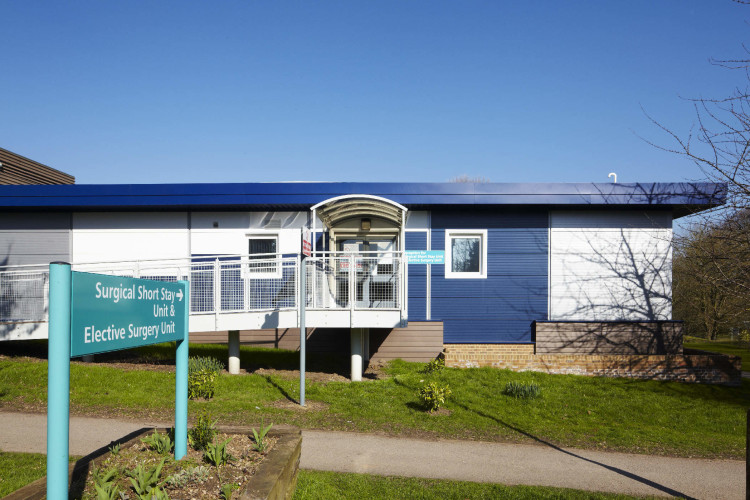An interim ward building for the Short Stay Surgery Unit, which was supplied by Foremans to Royal Surrey County Hospital NHS Foundation Trust, has been extended to create a further two new purpose-designed five-bed wards for the Elective Surgery Unit.
The building has also been refurbished externally with a new covered entrance and walkway, a new roof, low-level brick planters, and overcladding to each elevation using aluminium-faced panels in silver, blue and white for a more contemporary appearance and to further improve thermal performance and insulation.
The 26-module building was completed by Foremans to a tight programme of just 15 weeks from receipt of order to handover to allow the Trust to increase surgical bed capacity as fast as possible. In order to minimise any disruption to patient care, the recycled building modules arrived on site and were craned into position over a weekend.
Commenting on the project, Graham Maynard, Head of Capital and Estates at Royal Surrey County Hospital NHS Foundation Trust, said, “We are very pleased with the building, the extension and the appearance. Foremans performed well on this project and were sufficiently flexible to allow us to purchase and extend our interim ward accommodation to convert it to permanent use. We have had a good relationship with their team and would recommend their recycled modular building approach to other NHS trusts.”

Philip Howell of the Trust’s design consultants Drake & Kannemeyer, said, “The refurbished external appearance of the building provides a modern contemporary look and demonstrates what can be achieved when you combine the recycled modular approach with strong architectural design.”
As budgets become tighter in the current economic climate, healthcare providers need to look for alternatives to providing accommodation solutions that deliver best value and yet maintain quality – whether for interim or permanent applications.
With the Foremans approach, only the steel structure of the building is recycled – all fixtures and fittings, from doors and windows to wall linings and cladding, are new. However, the recycling of modular buildings is a more cost-effective alternative to both new manufacture and traditional site-based construction and is up to 70 per cent faster. It is also very sustainable, giving organisations an environmentally sound alternative to the disposal of surplus modular accommodation in landfill sites.
By re-using a modular building, less than 10 per cent of the carbon emissions are generated compared to a newly manufactured building of equivalent size. This dramatically improves a building’s carbon footprint.
Got a story? Email news@theconstructionindex.co.uk



